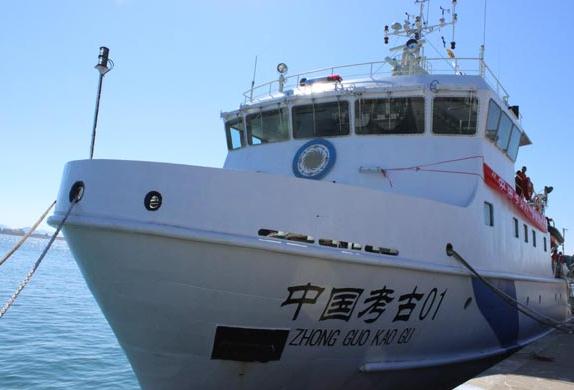

China's first underwater research vessel, China Archeology No 1, anchors in Qingdao, Shandong province. Wang Kaihao / China Daily
According to Chai, only a few other countries, such as France, South Korea and Greece, have professional underwater archeological vessels.
The ship's first assignment is being carried out near the port of Dandong in Liaoning province. Chai refused to reveal the details of the mission.
He says around 200 cultural heritage sites have been discovered along China's coasts, and his team plans to draw a map pinpointing each of the sites.
The National Center of Underwater Cultural Heritage became affiliated to the State Administration of Cultural Heritage in August to better coordinate and manage China's underwater archeological exploration.
The new center will act as a liaison between multiple departments, including the State Oceanic Administration and public safety authorities, to halt crimes such as the smuggling of cultural relics.
"We will not be able to achieve much without having a specific team focused on underwater work," says Li Xiaojie, director of the State Administration of Cultural Heritage. "The exploration of ocean resources means more than just the development of a maritime economy. It also serves a wider range of public interests."
Qingdao is the first base of the center, and its headquarters are in Beijing. Bases will also be built in other regions, including Zhejiang province's Ningbo, Hubei's provincial capital Wuhan and the Xisha Islands.
"The security situation has not been ideal," Li says, adding that relics have been illegally extracted from shallow areas of the South China Sea along the country's coast.
"Complicated disputes on maritime interests with neighboring countries have also given us pressure. Maritime archeology is more closely connected with overseas countries than other fields. To ensure our national interests, we will gradually promote cross-border cooperation, starting with academic studies and training programs."
China recently completed a three-year cooperative underwater archeology discovery quest with Kenya near the Kenyan city Malindi, working alongside the country's first professional underwater archeologist squad.
Li says the State Administration of Cultural Heritage will be more active in international projects under the framework of UNESCO. After the Silk Road and Grand Canal were listed as UNESCO World Heritage sites in June, China formally launched a bid to have the Maritime Silk Road—a historical trade and cultural corridor in the sea connecting the East and West that peaked during the Song (960-1279) and Yuan (1271-1368) dynasties—placed on the list.
Many ancient ships with treasures are buried along the corridor. "The enhancement of underwater archeological discovery is one of the keys to having the corridor listed as a World Heritage site," says Xie Xiuzhi, director of the Shandong Provincial Administration of Cultural Heritage.
The official application, which involves seven provincial-level administrative regions, will be submitted to UNESCO in 2016.
Li Xiaojie says China's underwater archeology lacks clear supervision, and "more rigid and timely regulation is a must".
"The rule of law offers the fundamental support to preserving the cultural relics," Li says.
Copyright ©1999-2018
Chinanews.com. All rights reserved.
Reproduction in whole or in part without permission is prohibited.